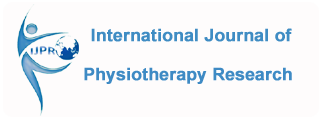IJPR.2023.141
Type of Article: Original Research
Volume 11; Issue 4 (August 2023)
Page No.: 4598-4605
DOI: https://dx.doi.org/10.16965/ijpr.2023.141
Effectiveness of Eccentric Exercise Training on Chronic Achilles Tendinopathy in Postmenopausal Women
Aishwarya Sanjay Patil 1, Poonam H Patil *2.
1 Intern, Department of Physiotherapy, Faculty of Physiotherapy, Krishna Institute of Medical Sciences “Deemed to be” University Karad- 415539, Maharashtra, India.
*2Assistant Professor, Department of Cardiopulmonary Sciences, Faculty of Physiotherapy, Krishna Institute of Medical Sciences “Deemed to be” University Karad- 415539, Maharashtra, India.
Address for Correspondence: Dr Poonam Patil, Assistant Professor, Department of Cardiopulmonary Science, Faculty of Physiotherapy, Krishna Institute of Medical Sciences “Deemed to be” University Karad – 415110, Maharashtra, India. Phone number- 8806111153 E-Mail: dr.ppatil8388@gmail.com
ABSTRACT
Background: In the Postmenopausal phase, there is a drastic reduction in estrogen levels which may alter tendon metabolism and production of different growth factors, resulting in chronic tendon disorders or tendon rupture. Achilles tendinopathy predominantly affects athletes, but it may also impact individuals with sedentary lifestyles, especially women in their postmenopausal stage. We studied the effectiveness of eccentric exercise training on chronic Achilles tendinopathy in postmenopausal women.
Methods: 31 females (aged 45-60, average age 51, BMI 27.6 ± 4.7, range 22.9- 32.3) in their postmenopausal phase with clinical diagnosis of chronic unilateral Achilles tendinopathy both insertional and mid-portion were assessed for pain and functional outcomes with VAS (on rest and on activity ) and VISA-A questionnaire before commencing the exercise and after completion of the training after a duration of 4 weeks.
Results: Participants showed an acute improvement in pain on rest and activity and the VISA-A score post-intervention. There was no significant difference in the pre- and post-score on the VAS scale and the VISA- Questionnaire. The mean VAS scale score on rest was 3.580 pre-intervention and 2.903 post-intervention, while the VAS scale score (on activity) was 7.451 pre-intervention which reduced to 6.096 post-intervention. The mean VISA-A score pre-intervention was 39.80, and post-intervention was 46.35.
Conclusion: Postmenopausal women suffering from chronic Achilles tendinopathy showed a significant result through training with an eccentric exercise program
KEYWORDS: Achilles tendon, Postmenopausal women, Eccentric exercises.
REFERENCES
[1]. Kanniappan V, Sathosh AM. To compare the effect of eccentric exercises and isometric exercises for achilles tendinitis in skaters. Journal of Lifestyle Medicine. 2020 Jan 31;10(1):49. DOI: 10.15280/jlm.2020.10.1.49
[2]. Li HY, Hua YH. Achilles tendinopathy: current concepts about the basic science and clinical treatments. BioMed research international. 2016 Nov 3;2016. doi: 10.1155/2016/6492597
[3]. Hess GW. Achilles tendon rupture: a review of etiology, population, anatomy, risk factors, and injury prevention. Foot & ankle specialist. 2010 Feb;3(1):29-32.
[4]. Longo UG, Ronga M, Maffulli N. Achilles tendinopathy. Sports medicine and arthroscopy review. 2018 Mar 1;26(1):16-30.
[5]. Maffulli N, Moller HD, Evans CH. Tendon healing: can it be optimised? British journal of sports medicine. 2002 Oct 1;36(5):315-6.
[6]. Peters JA, Zwerver J, Diercks RL, Elferink-Gemser MT, van den Akker-Scheek I. Preventive interventions for tendinopathy: A systematic review. Journal of Science and Medicine in Sport. 2016 Mar 1;19(3):205-11.
[7]. Ganderton C, Semciw A, Cook J, Pizzari T. The effect of female sex hormone supplementation on tendon in pre and postmenopausal women: a systematic review. Journal of musculoskeletal & neuronal interactions. 2016 Jun;16(2):92.
[8]. Bondarev D, Laakkonen EK, Finni T, Kokko K, Kujala UM, Aukee P, Kovanen V, Sipilä S. Physical performance in relation to menopause status and physical activity. Menopause. 2018 Dec 1;25(12):1432-41.
[9]. Frizziero A, Vittadini F, Gasparre G, Masiero S. Impact of oestrogen deficiency and aging on tendon: concise review. Muscles, ligaments and tendons journal. 2014 Jul;4(3):324.
[10]. Elgart B, Pietrosimone LS, Lucero A, Stafford HC, Berkoff DJ. Identifying achilles tendon structure differences by ultrasound tissue characterization in asymptomatic individuals. Scandinavian Journal of Medicine & Science in Sports. 2021 Oct;31(10):1914-20.
[11]. Šarčević Z. DECREASED MECHANICAL ADVANTAGE AS ONE OF THE CAUSES OF ACHILLES TENDINOPATHY. Coordination Abilities in Physical Education, Sports and Rehabilitation. 2016:278.
[12]. Verges J, Martínez N, Pascual A, Bibas M, Santiña M, Rodas G. Psychosocial and individual factors affecting Quality of Life (QoL) in patients suffering from Achilles tendinopathy: a systematic review. BMC Musculoskeletal Disorders. 2022 Dec;23(1):1-0.
[13]. Silbernagel KG, Gustavsson A, Thomeé R, Karlsson J. Evaluation of lower leg function in patients with Achilles tendinopathy. Knee Surgery, Sports Traumatology, Arthroscopy. 2006 Nov;14(11):1207-17.
[14]. Hasan T, Ganesh K. Genetic regulators of Achilles tendon pathogenesis and outcomes. Global Adv Res J of Med and Medic Sci. 2018;7(10):207-13.
[15]. Murtaugh B, Ihm JM. Eccentric training for the treatment of tendinopathies. Current sports medicine reports. 2013 May 1;12(3):175-82.
[16]. Stanish WD, Rubinovich RM, Curwin S. Eccentric exercise in chronic tendinitis. Clinical orthopaedics and related research. 1986 Jul 1(208):65-8.
[17]. Hansen M, Kongsgaard M, Holm L, Skovgaard D, Magnusson SP, Qvortrup K, Larsen JO, Aagaard P, Dahl M, Serup A, Frystyk J. Effect of estrogen on tendon collagen synthesis, tendon structural characteristics, and biomechanical properties in postmenopausal women. Journal of Applied Physiology. 2009 Apr;106(4):1385-93.
[18]. Sayana MK, Maffulli N. Eccentric calf muscle training in non-athletic patients with Achilles tendinopathy. Journal of Science and Medicine in Sport. 2007 Feb 1;10(1):52-8.
[19]. Grävare Silbernagel K, Thomee R, Thomee P, Karlsson J. Eccentric overload training for patients with chronic Achilles tendon pain–a randomised controlled study with reliability testing of the evaluation methods. Scandinavian journal of medicine & science in sports. 2001 Aug;11(4):197-206.
[20]. Nørregaard J, Larsen CC, Bieler T, Langberg H. Eccentric exercise in the treatment of Achilles tendinopathy. Scandinavian journal of medicine & science in sports. 2007 Apr;17(2):133-8.











 Users Today : 280
Users Today : 280 Users Yesterday : 187
Users Yesterday : 187 This Month : 3584
This Month : 3584 This Year : 32116
This Year : 32116 Total Users : 133889
Total Users : 133889 Views Today : 600
Views Today : 600 Total views : 477232
Total views : 477232 Who's Online : 31
Who's Online : 31